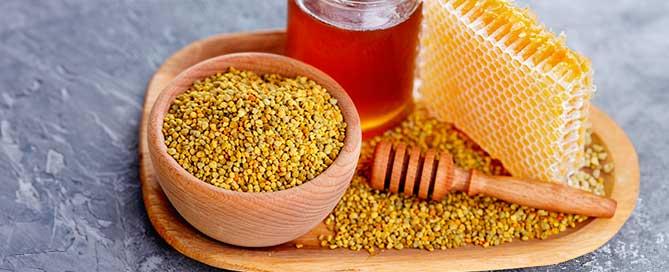Bee pollen, known as the “gold of 2024,” is an incredibly valuable and beneficial natural resource for both humans and our canine companions. Although it has existed since time immemorial, it remains largely unknown to many in our modern society. This article explores the properties of bee pollen, its positive impact on dogs’ health, and how to effectively integrate it into their diet.
What is Bee Pollen?
Bee pollen is a mixture of flower pollen, nectar, enzymes, honey, wax, and bee secretions. Worker bees collect the pollen and transport it to the hive, where it is compacted into small pellets. This superfood contains a wide range of essential nutrients, such as amino acids, vitamins, and minerals, making it an excellent dietary supplement for dogs.
Benefits of Bee Pollen for Dogs
Natural Multivitamin
Bee pollen is one of the most potent natural multivitamins available. It contains a variety of essential vitamins, including:
- Vitamin A: Important for skin and coat health.
- B Vitamins: Crucial for energy production and metabolism.
- Vitamin C: An antioxidant that supports the immune system.
- Vitamin D: Essential for bone health.
Antibiotic and Anti-inflammatory Properties
Bee pollen has natural antibiotic properties that can help fight infections and keep harmful bacteria at bay. Additionally, its anti-inflammatory qualities can benefit dogs suffering from chronic inflammation, arthritis, or other inflammatory conditions.
Immune System Boost
Bee pollen is known for its immune-boosting properties. It helps strengthen the immune system, making dogs less prone to diseases and allergies. This is especially useful for young dogs, older dogs, or those with compromised immune systems.
Improved Muscle and Coat Health
The high protein and amino acid content in bee pollen promotes muscle development and tissue repair. It also contributes to a healthy and shiny coat, thanks to the vitamins and minerals that nourish the skin and hair from within.
How to Incorporate Bee Pollen into Your Dog’s Diet
Incorporating bee pollen into your dog’s diet is easy and can be done in various ways. Here are some practical recommendations based on the size of the dog:
Recommended Dosage
- Small dogs (under 25 kg): One teaspoon per day.
- Medium dogs (between 25 and 45 kg): One tablespoon per day.
- Large dogs (over 45 kg): Up to two tablespoons per day.
Administration Method
Bee pollen can be administered in various ways to ensure your dog consumes it:
- Mixed with yogurt: This is an easy and tasty way to administer pollen. Simply mix the recommended dosage of pollen with some plain, unsweetened yogurt and offer it to your dog as a treat.
- Powdered in water: If your dog is reluctant to eat pollen, you can grind it into a powder and mix it with water. This is particularly useful for dogs that need a quick energy and vitamin boost.
- Incorporated into food: Sprinkle the pollen directly onto your dog’s food. This can be especially effective if your dog is already accustomed to eating wet food or homemade mixes.
Additional Considerations
It’s important to introduce bee pollen gradually into your dog’s diet to observe any potential allergic reactions. Start with a small amount and gradually increase to the recommended dosage.
Contraindications and Precautions
Although bee pollen is generally safe for most dogs, there are some precautions to consider:
- Allergies: Some dogs may be allergic to bee pollen. Watch for any signs of allergic reactions, such as itching, swelling, or difficulty breathing. If you notice any of these symptoms, discontinue use and consult your veterinarian.
- Preexisting conditions: If your dog has any preexisting medical conditions, consult your veterinarian before introducing bee pollen into their diet.
Bee pollen is a natural superfood with numerous benefits for dogs’ health. Its multivitamin, antibiotic, anti-inflammatory, and immune-boosting properties make it an ideal dietary supplement for keeping your dog healthy and happy. Additionally, it is easy to administer and can be incorporated into the daily diet in various ways.
Although bee pollen is a wonderful option for most dogs, it’s always important to observe any potential adverse reactions and consult your veterinarian if in doubt. By introducing this “gold of 2024” into your dog’s diet, you will be investing in their long-term health and well-being.
A Personal Note
In our home, we have witnessed firsthand the benefits of bee pollen in our own dogs. From improving their energy levels to making their coats shinier than ever, this superfood has been an invaluable addition to our care routine. Mixing it with yogurt has been our preferred method, as our dogs find it delicious and consume it enthusiastically.
So, if you are looking for a natural and effective way to improve your dog’s health, we encourage you to try bee pollen. You may be pleasantly surprised by the results.
Until next time, Cane Corso friends! Take care of your furry ones and don’t hesitate to explore the wonderful benefits of bee pollen. A big hug and see you soon. Bye!


